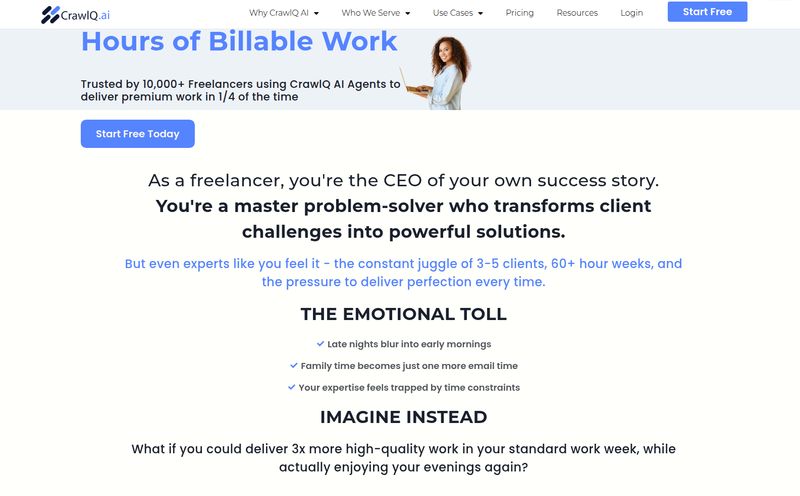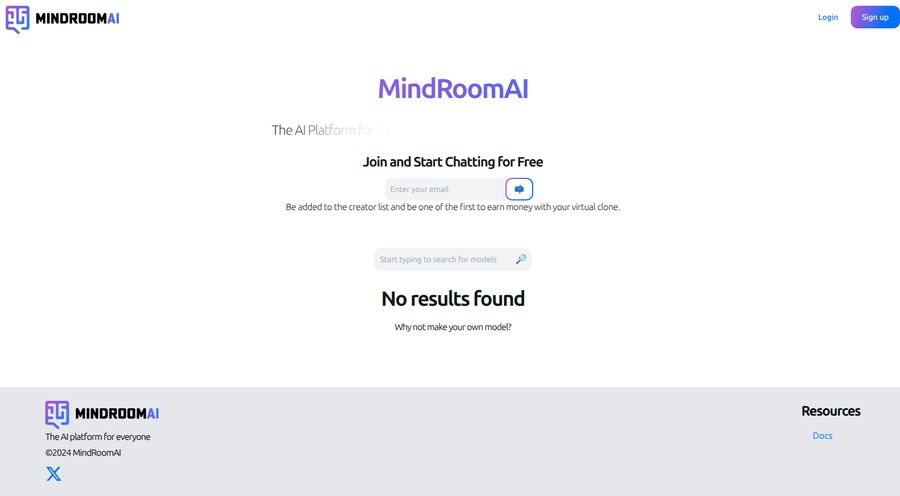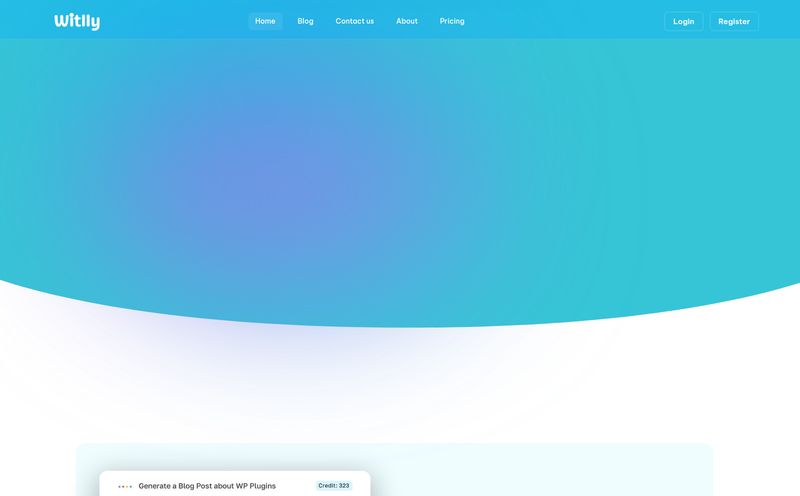The internet feels... weird lately. As an SEO, I've spent years navigating the digital currents, and right now, the water is choppy. We're drowning in a sea of perfectly structured, AI-generated content that all sounds vaguely the same. Finding a genuinely interesting, human conversation feels like panning for gold in a river of recycled plastic. You get your answers from a chatbot, you scroll through a social feed designed to make you angry, and you learn in a silo. It can be a lonely place to try and get smarter.
So, when I stumbled across a platform called Socratic Lab, my curiosity was definitely piqued. The pitch? An AI-powered community for learning and sharing knowledge. My internal skeptic immediately raised an eyebrow. "AI-powered community" can mean anything from a glorified forum with a chatbot to something genuinely new. But the name itself—Socratic Lab—hints at something more. It suggests dialogue, questioning, and experimentation. Not just a database of facts.
I decided to put on my blogger hat, push the skepticism aside (mostly), and see if this is the digital town square we've all been missing.
What Exactly Is Socratic Lab? More Than Just a Q&A Site
Okay, so let's break it down. At its core, Socratic Lab is a platform where people can ask questions, share what they know, and have discussions. Sounds a bit like Quora or Reddit, right? Yes, but with a twist that makes all the difference. It's built on a foundation that intentionally blends artificial intelligence with human collaboration.
Think of it less like a sterile, silent library where you look up a fact and leave, and more like a bustling, vibrant workshop. In one corner, you have the AI—a smart, helpful assistant that can organize information, suggest connections, and get the ball rolling. But the real work, the creative sparks and the deep insights, happen when people start talking to each other. It’s trying to create an environment for what they call 'collective wisdom'. A bold goal, for sure.
This isn't just about finding the one correct answer. It's about exploring a topic from varied perspectives, seeing how an expert's take differs from a newcomer's, and building knowledge together. That's a philosophy I can get behind. In my line of work, the best traffic generation strategies often come not from a single data point, but from a conversation with another marketer who sees the world differently.

Visit Socratic Lab
The Core Features That Make It Tick
A platform is only as good as its tools. Socratic Lab seems to understand this, focusing on a few key elements to bring its vision to life.
The AI-Powered Shepherd, Not the Oracle
The AI component here is fascinating. It's not positioned as an all-knowing oracle that spits out definitive answers. I've had my fill of those, and frankly, their overconfidence is getting a little scary. Instead, the AI in Socratic Lab acts more like a moderator or a research assistant. It helps structure conversations and provides a baseline of information, but it's designed to kickstart human interaction, not replace it. It’s like a helpful librarian who points you to the right section and introduces you to a few other people reading the same books. This is a much healthier human-AI relationship in my opinion.
The Power of the People: Interactive Forums
This is the heart of the platform. The interactive forums are where the magic is supposed to happen. It reminds me a bit of the old-school internet forums—the good parts, anyway. Back in the day, I learned half of my SEO tradecraft from dusty corners of the web where experts would just... talk. No algorithms, no influencers, just shared passion. Socratic Lab is trying to recapture that spirit in a modern, cleaner package. The quality of these forums will make or break the platform. It's all about fostering insightful conversations rather than just flame wars or low-effort memes.
Tapping into Real Expertise (Hopefully)
The platform promises access to subject matter experts. This is a huge selling point. The internet has democratized information, but it has also made it incredibly difficult to tell who actually knows what they're talking about. If Socratic Lab can successfully attract and verify genuine experts and give them a place to share their specialized insights, that would be a game-changer. It turns the platform from a simple discussion board into a hub for genuine skill acquisition and research collaboration.
My Honest Take: The Good, The Bad, and The AI
No tool is perfect, and after spending some time exploring, I've got some thoughts. As with anything new, there's a lot of potential and a few significant hurdles.
On the plus side, the concept is a massive breath of fresh air. The emphasis on community-driven, collaborative learning is exactly what's missing from so many digital spaces. For my work, it's a potential goldmine. Imagine being able to see real, nuanced discussions about a topic you're writing about. It’s raw user intent research! You can see the language people use, the pain points they have, and the follow-up questions they ask. That's infinitely more valuable than just looking at a list of keywords. I've always felt that the best content comes from deeply understanding the conversation your audience is already having.
However, we need to talk about the downsides. The platform itself notes the potential for inaccurate information. This is the double-edged sword of any crowd-sourced system, from Wikipedia to Reddit. Add AI into the mix, with its tendency to confidently 'hallucinate' facts, and you have a real challenge. You have to approach the content with a healthy dose of skepticism. Furthermore, the entire model relies on active community participation. A new platform can easily become a ghost town if it doesn't reach a critical mass of users. It's a classic chicken-and-egg problem. It needs a vibrant community to be useful, but it needs to be useful to attract a vibrant community. I've seen too many promising platforms wither on the vine for this very reason.
What's the Price of Admission?
This is often the first question people ask, right? As of me writing this article, the pricing for Socratic Lab is a bit of a mystery. Their website doesn't list a clear pricing page or subscription model. For now, it seems to be free to join and participate, likely to encourage growth and build that critical mass of users I was just talking about. I wouldn't be surprised to see a freemium model in the future, maybe with premium features for power users, private groups, or advanced AI tools. But for now, you can seemingly jump in without opening your wallet, which is a big plus for giving it a test run.
Who is Socratic Lab Actually For?
So, who should be signing up? The obvious answer is students and lifelong learners. Anyone who is tired of passive learning and wants to engage with material on a deeper level would feel right at home here. If you're studying a complex topic for college or just trying to learn a new skill like coding or digital marketing, the mix of AI-assisted learning and peer discussion could be incredibly effective.
But from my professional point of view, the audience is broader. I see huge value for:
- Content Creators and Marketers: As I mentioned, it's a fantastic place for topic ideation and audience research.
- Researchers and Academics: A space for interdisciplinary collaboration and to float new ideas before they're ready for formal publication.
- Professionals and Experts: A platform to build authority, mentor others, and stay sharp by engaging with curious minds.
It's for anyone who believes that the smartest person in the room is the room itself.
How It Stacks Up Against the Competition
It's easy to lump Socratic Lab in with platforms like Reddit or Quora, but that's not quite right. Quora has become heavily gamified and, at times, feels overrun with thinly veiled marketing. Reddit is amazing, but it's also a chaotic mix of everything imaginable; it's not a dedicated learning environment. Socratic Lab's main differentiator is its focus. It's purpose-built for learning and knowledge exchange, trimming away the distractions that plague more general-purpose platforms. The integration of AI as a facilitator rather than just an answer-bot is also a unique angle that sets it apart from a simple forum or a standalone chatbot.
It feels like it's trying to be a more structured, intelligent version of a specialized Discord or Slack community, open to everyone.
The Final Word
So, is Socratic Lab the solution to our modern internet woes? Maybe. It's too early to call it a revolution, but it's a very, very interesting experiment. It correctly identifies the problem: we have more information than ever but less genuine connection and dialogue. It's taking a thoughtful swing at solving that problem by blending the efficiency of AI with the irreplaceable nuance of human community.
It won't be for everyone, and its success hinges entirely on its ability to grow a healthy, engaged user base. But I'm optimistic. I'm tired of the content echo chamber, and I'm excited by any platform that encourages us to talk to each other instead of just consuming content at each other. It’s a bold idea, and in the current digital climate, I think bold ideas are exactly what we need.
Frequently Asked Questions about Socratic Lab
- What is Socratic Lab?
- Socratic Lab is an online platform that combines artificial intelligence with a community of users to facilitate learning and knowledge sharing through discussions, forums, and collaboration.
- Is Socratic Lab free to use?
- As of late 2023, Socratic Lab appears to be free to join and use. They do not currently have a public pricing page, though they may introduce premium plans in the future.
- How is Socratic Lab different from Reddit or Quora?
- While it shares features with them, Socratic Lab is specifically designed as a learning environment. It uses AI to facilitate discussions rather than just answer questions, and it aims for a more focused, collaborative atmosphere than the broader, more social nature of Reddit or Quora.
- Can I trust the information on Socratic Lab?
- Like any crowd-sourced platform, information should be approached with a critical eye. While it aims to connect users with experts, the quality of information depends on the community. It's best used as a place for discussion and perspective-gathering rather than a source of absolute fact.
- Who should use Socratic Lab?
- It's ideal for students, lifelong learners, professionals, content creators, and anyone looking for a deeper, more interactive way to learn about new topics and engage with a community of curious individuals.
- Is the AI in Socratic Lab just another ChatGPT?
- No. While it likely uses similar underlying technology, its role is different. The AI is integrated to act as a facilitator, researcher, and conversation starter to support the human community, not to act as a standalone answer engine.
Reference and Sources
- Socratic Lab Official Website: https://socraticlab.ai/



